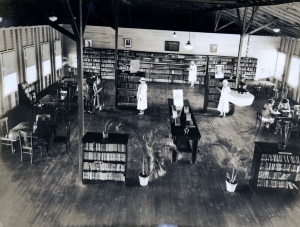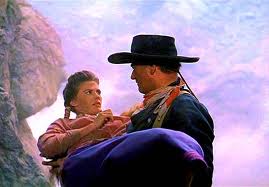
The interior of the Key West Library at the Knights of Columbus Hall, 1021 Duval St., in the 1930s. Photo from the Monroe County Library collection.
My reading so far this year has been almost exclusively historical fiction (with two exceptions, one good and one not-so-much).
I went on a Bernard Cornwell binge, picking up the Saxon Chronicles with the second volume, The Pale Horseman, then gobbling down the the next five after that in fairly short order (The Lords of the North, Sword Song, Death of Kings, The Burning Land, The Pagan Lord). I did this even though I’m not sure this is the best way to read this series. I got a little tired of Uhtred sometimes. But these are fine adventure tales and now I feel a tiny bit more educated about the history of England before it was England and the various Norse incursions. If you like the TV show Vikings, these are definitely worth a read.
I read The Day of Atonement by David Liss, a writer of historical fiction whom I’ve admired since I reviewed his book The Whiskey Rebels for Solares Hill back in the day. This new one is an interesting take on European historical fiction, set in the 18th century with the hero being a Portuguese Jew who is forced to flee to England as a boy and returns to take his revenge. Another fine adventure tale.
Not historical: on the recommendation of Cheryl Tan, I read Man V. Nature by Diane Cook. It’s a book of short stories and the first published work of fiction by a former This American Life Producer (yay, radio!). Dystopian on the rocks from a woman’s perspective. If you like the world of George Saunders, check these out and keep an eye on Cook.
In February, around the time that Fifty Shades of Grey movie hype was reaching full cry, I retreated to much-better works of romance written by another E. James — this is Eloisa James, who writes very good historical romances (and in real life is Mary Bly, a professor of literature at Fordham). The books I read this time were her Duchess Quartet (even though they don’t all feature duchesses, whatever) — not quite as good as some of her more recent titles but enjoyable nonetheless and if you want some enjoyable entertainment with some sex in it and possibly unrealistic romantic scenarios — skip Fifty Shades and read her instead.
I also caught up on a couple of historical crime series in my favorite period — the Tudors! Treachery by S.J. Parris wasn’t published in the U.S., so far as I can tell, so I broke down and ordered a copy from Amazon UK. It’s the fourth in her Giordano Bruno series and it’s as good if not better than the predecessors. I continue to have concerns about her hero’s future prospects, based on the fate that befell the real-life Bruno. But I enjoy these stories anyway.
And finally got around to An Air of Treason, the latest from P.F. Chisholm, aka Patricia Finney when she’s writing her excellent series about Sir Robert Carey, cousin/nephew of Queen Elizabeth. And this one has a couple cameos from QE I herself, along with Carey’s usual entertaining way with the ladies and his enemies.
I got an early look Dennis Lehane’s third novel about the Coughlin family, World Gone By, because I reviewed it for The Miami Herald. If you follow the link you’ll see I liked the book a lot — it continues the story of Joe Coughlin, the center of the previous book, Live By Night. This one is set in the 1940s and while Joe hasn’t left the world of organized crime he’s stepping back from running the show. As you can imagine, though, extricating yourself and protecting those you love isn’t that easy, even for an exceptionally smart guy like Joe. I think this book stands on its own though it would be enriched by having read Live By Night and even the first in the series, The Given Day. Apparently, Lehane’s contemporary crime fiction sells much better, which is a shame if it discourages him or his publishers from more books like this.
The best and worst for last. The best book I’ve read so far this year is another work of historical fiction: All The Light We Cannot See by Anthony Doerr. This was a National Book Award finalist, for good reason. It’s an immersive novel set during World War II, with the intertwining stories of a blind French girl and a talented German radio operator. The chapters are really short so it has the page-turning propulsion of a thriller but with beautiful writing that makes you simultaneously want to slow down and savor it. Just a great read, on just about every level.
Not so great: I Am Pilgrim by Terry Hayes. This is disappointing because it came at the recommendation of a reading friend whose tastes are very similar to mine. While I don’t read a lot of thrillers, I enjoy them occasionally (I liked Red Sparrow a lot when I read it last year). This one had promise, coming from a veteran screenwriter — I have come to trust that writers from the world of screens know how to craft stories. But this one, while far better written than, say, the works of Dan Brown, hit my plausibility buttons too many times. I *know* these are not supposed to be realistic. I enjoy James Bond and Jason Bourne movies. But the idea that this one guy would be at the center of all these events that happen to all collide at one place on the Turkish coast? Oh well. I did finish it even though it was annoying me and I didn’t really care how our hero was going to save the world. Since then I’ve been bouncing off a couple different books, which is REALLY annoying. Which has led me to conclude: I’d rather be immersed in a book I don’t like all that much than not immersed at all. Is there a name for that syndrome?










 My husband and I have a long-running, never-to-be-resolved argument about which Tom McGuane novel set in Key West is better. He likes Panama, I prefer 92 in the Shade. But there’s no dispute about which was made into a better movie, mainly because, to my knowledge, they never made a movie of Panama. The movie version of 92 in the Shade, however, is not only an entertaining film with a knockout cast (Peter Fonda! Warren Oates! Harry Dean Stanton! Elizabeth Ashley! Margot Kidder!). It’s essential viewing for anyone interested in Key West’s recent history, especially of that really really interesting era when the Navy was leaving, the new bridges and water line weren’t here yet and marijuana smuggling was completely out of hand.
My husband and I have a long-running, never-to-be-resolved argument about which Tom McGuane novel set in Key West is better. He likes Panama, I prefer 92 in the Shade. But there’s no dispute about which was made into a better movie, mainly because, to my knowledge, they never made a movie of Panama. The movie version of 92 in the Shade, however, is not only an entertaining film with a knockout cast (Peter Fonda! Warren Oates! Harry Dean Stanton! Elizabeth Ashley! Margot Kidder!). It’s essential viewing for anyone interested in Key West’s recent history, especially of that really really interesting era when the Navy was leaving, the new bridges and water line weren’t here yet and marijuana smuggling was completely out of hand.